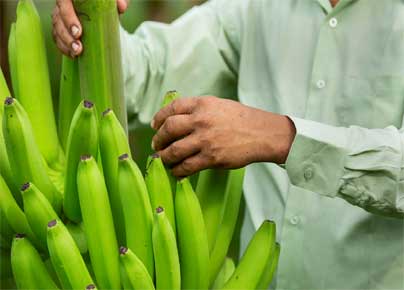Manila Approves Gene-Edited Banana Varieties
2024-07-05

The Bureau of Plant Industry (BPI), a Department of Agriculture subsidiary, has issued Tropic Biosciences a noncoverage certificate for the Department Circular (JDC) 1, 2021 series. Tropic Biosciences has developed reduced browning bananas (TRB011011 and TRB11002) utilising the CRISPR-Cas9 gene editing system.
According to the International Service for the Acquisition of Agri-biotech Applications (ISA), these bananas have the potential to decrease food waste and carbon dioxide emissions, equivalent to eliminating 2 million cars from the road annually. This statement was published in the June issue of ISAAA's online weekly publication, Biotech Update. Tropic Biosciences provided scientific evidence to BPI to secure the noncoverage. BPI's decision is based on the Technical Consultation for Evaluation and Determination procedure outlined in DA Memorandum Circular No. 08 s. 2022 Rules and Regulation to Evaluate and Determine when Products of Plant Breeding Innovations (PBIs) fall under JDC 1. Dr. Ofir Meir, Tropic's Chief Technology Officer, stated, "The Philippine Government has implemented a science-based, transparent, and efficient process for assessing the safety of gene-edited plants. This is precisely the type of system that encourages companies like Tropic to invest in innovative technologies to develop sustainable solutions for Filipino farmers."
In 2023, BPI granted the same certification to another reduced browning banana variety developed by Tropic. Bananas are one of the Philippines' top exports. Last year, data from the PSA indicated that the country's earnings from banana exports reached $1.22 billion, a 17% increase from the $1.097 billion recorded in 2022.
ISA also reported that Sanatech Seed's Sicilian Rouge tomato, which contains high levels of gamma-aminobutyric acid (GABA), was approved this year. The certificate permits the country to import and cultivate these gene-edited crops.
In May, ISAAA reported that Sanatech introduced the high GABA tomato in Japan in 2021. It was developed using CRISPR-Cas9 technology to contain high levels of GABA, an amino acid known to help lower blood pressure. The gene-edited tomato includes four to five times more GABA than conventional tomato varieties, promising significant health benefits.
Based on the scientific evidence provided by the developer, BPI classified the gene-edited tomato as a non-GMO. This means it will not undergo the regulatory pathway for evaluating the biosafety of GMOs in the country, as guided by JDC 1, simplifying the approval process.









